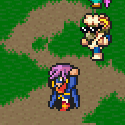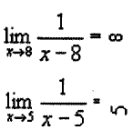|
Yeah I was saying you can use a Set object as your key. I'm phoneposting so you'll have to look up the docs yourself, but the key to a HashMap is the hashcode of whatever object you use, and two Sets will have the same hashcode if .equals() returns true for them. And for two Sets, they're equal if they contain the same elements, no more no less. So you can put an arbitrary number of things into your key Set, and if you make another Set with the same things in it, you can lookup that entry in the map. Order doesn't matter in basic sets, so it'll just match on the contents, so it's nice and neat and extensible. You just need to make sure the objects in your original key Set and your lookup Set are the same - adding a String constant or something for each item type will do it. So like Java code:and then make another set the same way (in a different order if you like) when you're looking up the result of that combo. There are other ways to build a set like Collections.addAll, so the neatest way depends on your program flow really. Hopefully you get the idea!
|
|
|
|

|
| # ? Jun 11, 2024 07:04 |
|
Silly question: I've heard, vaguely, that in Java 7 there's a shortcut by which I can do something like this without getting the warning:code:
|
|
|
|
You can do new ArrayList<>(); and it will infer the generic argument from the return type
|
|
|
|
Yeah, it's <>, which is called the diamond operator.
|
|
|
|
Alternatively if you can't use java 7+ for some reason (you poor, poor soul), Guava has Lists.newArrayList() which is nice and compact.
|
|
|
|
I'm doing a text adventure game to bone up on my Java. I'm working on the player actions at the moment, and I'm hoping there's a better way. I could do a Hashmap of all the actions and their associated methods, then once a player enters their action (LOOK, NORTH, etc), use Reflection to dynamically call the appropriate method. Except I'm reading that Reflection is kind of a poor way to go. Is there a better way that isn't a giant Switch statement of each action?
|
|
|
|
If you're on java 8, maybe lambdas could do what you need cleanly.
|
|
|
|
Mortanis posted:I'm doing a text adventure game to bone up on my Java. I'm working on the player actions at the moment, and I'm hoping there's a better way. I could do a Hashmap of all the actions and their associated methods, then once a player enters their action (LOOK, NORTH, etc), use Reflection to dynamically call the appropriate method. Except I'm reading that Reflection is kind of a poor way to go. Is there a better way that isn't a giant Switch statement of each action? Oh god no please don't do that. Java isn't C++ and you really shouldn't be trying to do function pointers like that. You can use reflection to do it but its a really roundabout and inefficient way. Ive written dozens of text adventure games and every one either had a big if/else block or a big switch/case block. What's so wrong about that? Everybody hates on having lots of if/else or a big switch/case but sometimes that's the easiest way to express what the logic calls for. Having a hashmap to call reflection is way way way nastier than just having a big block of if/else if/else if/else if/else. You should only have one if/switch condition for each action (if you want to accept partial entries like "look" and "look at" and stuff use a method to detect which it matches or something instead of multiple statements) and if the logic for the action is more than a few lines then it should be broken out into a private method call. That's how you make it cleaner. Don't hate on the if/else. How many actions are you even going to have? North, South, East, West, Look, Get, Use... 7 if/else or switch/case lines is nothing bad at all. Zaphod42 fucked around with this message at 17:31 on Nov 3, 2015 |
|
|
|
I was checking to see if I was missing something obvious, but if a Switch isn't a big deal, I'll certainly do that. Thanks!
|
|
|
|
Zaphod42 posted:You should only have one if/switch condition for each action (if you want to accept partial entries like "look" and "look at" and stuff use a method to detect which it matches or something instead of multiple statements) and if the logic for the action is more than a few lines then it should be broken out into a private method call. That's how you make it cleaner. Don't hate on the if/else. I was thinking you could maybe map them to category constants, then do the conditional stuff on that. commandCategories.get("NORTH") returns CATEGORY_MOVEMENT, and then you can do a switch on that and call handleMovement("NORTH"). Just as a way to group common stuff together and make the branching a little simpler. Depends on how complex and categorisable your command set is really This sounds like a more specialised problem though, since it's really about a parser. Are there any library tools focused on that kind of thing?
|
|
|
|
baka kaba posted:I was thinking you could maybe map them to category constants, then do the conditional stuff on that. commandCategories.get("NORTH") returns CATEGORY_MOVEMENT, and then you can do a switch on that and call handleMovement("NORTH"). Just as a way to group common stuff together and make the branching a little simpler. Depends on how complex and categorisable your command set is really If anything though that's just making it more complicated. Which is simpler to you, a single switch/case with 7 statements, or a nested switch/case with 4 statements, where each of those branches into another switch/case with 4 statements? If it ain't broke don't fix it  Like you said, depends upon how complex your command set is really. Things like that could be useful if you have a ton of commands, but I don't really see that being necessary. At least not to start, you could always adapt it that way if you end up with too many commands. Like you said, depends upon how complex your command set is really. Things like that could be useful if you have a ton of commands, but I don't really see that being necessary. At least not to start, you could always adapt it that way if you end up with too many commands.
|
|
|
|
Well yeah, but I'm thinking of text adventures I've played where there's a bit more than 7 commands! If you're looking at some huge conditional for every possible command it would help to break it down, as well as making it easier to maintain and expand. You can have a nice initialisation section where your commands are categorised and stuck in a map, a conditional bit that pipes commands to a method that handles that category, and then methods that look at the specific command and do a thing. Definitely overkill for something simple but I start to get twitchy when I see big code blocks
|
|
|
|
baka kaba posted:Well yeah, but I'm thinking of text adventures I've played where there's a bit more than 7 commands! If you're looking at some huge conditional for every possible command it would help to break it down, as well as making it easier to maintain and expand. You can have a nice initialisation section where your commands are categorised and stuck in a map, a conditional bit that pipes commands to a method that handles that category, and then methods that look at the specific command and do a thing. Definitely overkill for something simple but I start to get twitchy when I see big code blocks You can achieve the same organization by simply having a switch/case that then pipes commands to a method that handles that category. 
|
|
|
|
True, I'm just thinking of the separation between classification and handling. Depends if it's worth it!
|
|
|
|
While this is relevant here, it could probably go in the Coding Horrors thread, too.code:
|
|
|
|
I dunno, the only part of that which looks like a horror to me are the methods with a ton of arguments and the variable names which are all extremely poor. The actual switch/case seems fine to me.  If you made it an if/else-if you could compound those multiple switch statements into a single line but its not really that bad as-is. If you made it an if/else-if you could compound those multiple switch statements into a single line but its not really that bad as-is.Almost all of the conditions just invokes a method so that's actually pretty clean IMO, if only the method names and variable names were more significant.
|
|
|
|
Isn't this like, the classic case for a Command pattern, why would you not use it?
|
|
|
|
Loezi posted:Isn't this like, the classic case for a Command pattern, why would you not use it? Yes and no, you could build objects to use the command pattern but that doesn't really save you any on having to do the parsing and having the big logic tree, that just gives you a convenient way to dispatch those commands once you've determined what they should be. That's not really any simpler than just invoking methods in this case. In fact it kinda smells of the Enterprise Java approach, making things unnecessarily complicated and requiring a ton of classes and boilerplate to do the same thing. Unless you needed it to be multi-threaded, or to be a public API, or you wanted to record the entire history of events or something, then I wouldn't bother. Even then its not necessary but it becomes more of the better approach in those cases. Like carry on then said you could use lambdas too but it doesn't really save you any trouble. Like baka kaba said its really just about a parser and then the logic to determine what to do based on that parser. I don't see any way to get around the fundamental issue.
|
|
|
|
Alright so I'm learning java and have gotten to a part that I can't wrap my head around because I guess I'm an idiot. I'm trying to find the sum between 2 numbers (each number that occurs between those two numbers get's added to the sum) and I guess I don't understand how to change variables? It's probably some minor thing but I don't really know what to google for. Here's the code: [code=Java] import java.util.Scanner; public class TheSumBetweenTwoNumbers { public static void main(String[] args) { Scanner reader = new Scanner(System.in); int sum = 0; int helper = 0; System.out.println("First number: "); int start=Integer.parseInt(reader.nextLine()); System.out.println("Second number: "); int end = Integer.parseInt(reader.nextLine()); while (end > helper){ helper= start + 1;} sum= sum + helper; System.out.println("The sum is " + sum); } } [\code] Any help? Also any suggestions on what I can google so I can understand this better? This is probably the simplest thing in the world. casual poster fucked around with this message at 00:01 on Nov 4, 2015 |
|
|
|
So if start=3, and end=7, you want sum to equal 3+4+5+6+7? I read your post again, now it is clear that is indeed what you're trying to do. To answer your confusion about variables, I don't know what you mean by "change" variables. You're not an idiot, the fact that you're trying to figure it out is enough proof that you're doing the right thing. Also, i haven't run your code but it looks like you're on the right path. To solve the problem, if you want a mathy way to do it without loops, checkout this wiki page. Just read the intro https://en.wikipedia.org/wiki/Summation . You can solve the problem by using the summation equation found in the intro twice, and a subtraction. maybe there is even a simpler single equation that you could use. Jerry Bindle fucked around with this message at 00:12 on Nov 4, 2015 |
|
|
|
Barnyard Protein posted:So if start=3, and end=7, you want sum to equal 3+4+5+6+7? Yeah exactly!
|
|
|
|
Could you provide a little more description about what is confusing you about the variable usage?
|
|
|
|
You know I'm probably just confusing terms. The code I posted doesn't run, as a matter of fact it just runs to infinity. I guess I'm just trying to figure out what the code should resemble so that I can learn it?
|
|
|
|
casual poster posted:You know I'm probably just confusing terms. The code I posted doesn't run, as a matter of fact it just runs to infinity. I guess I'm just trying to figure out what the code should resemble so that I can learn it? Yeah, you're never incrementing Helper at all, so your while loop never terminates. Try looking into for loops.
|
|
|
|
I don't really know how to teach people to program, but I'm trying to learn that. I think I should give you a hint without giving away the whole thing. this isn't how i'd do it, but I'm following your way of solving the problem to help connect the dots Java code:
|
|
|
|
I did it! I used this code:Java code:Thanks a lot!
|
|
|
|
Nice! Because i'm a broken person i did it this way for goofs: Java code:
|
|
|
|
Barnyard Protein posted:Nice! Haha you go and patiently explain it to him and then for funsies afterwards you drop the troll.  (I mean that's a good way to do it but he's not going to be able to understand that at all) I remember learning that n * (n+1) / 2 method in high school math class, forgot about it for awhile though. Super useful. Although if the start number is very large than this way is pretty inefficient, but NBD. I like that you're effectively doing like an integral sum, the differences of two series. Zaphod42 fucked around with this message at 01:15 on Nov 4, 2015 |
|
|
|
I've been converting motor control algorithms written in python/numpy to java 8 for the past few months and boy are my numerical methods tired
|
|
|
|
Zaphod42 posted:Yes and no, you could build objects to use the command pattern but that doesn't really save you any on having to do the parsing and having the big logic tree, that just gives you a convenient way to dispatch those commands once you've determined what they should be. You can replace the logic tree with a command name -> command object hash if you want, though.
|
|
|
|
Zaphod42 posted:
And when you think that Gauss saw that in elementary school.
|
|
|
|
Mortanis posted:I'm doing a text adventure game to bone up on my Java. I'm working on the player actions at the moment, and I'm hoping there's a better way. I could do a Hashmap of all the actions and their associated methods, then once a player enters their action (LOOK, NORTH, etc), use Reflection to dynamically call the appropriate method. Except I'm reading that Reflection is kind of a poor way to go. Is there a better way that isn't a giant Switch statement of each action? Depending on the number of actions I'm inclined to agree with the other responses (just use a switch statement). If there are a large number of actions or you want to do things The Java Way (tm), a better answer than reflection is to use an enum. Enums in Java are much more powerful than their C/C++ counterparts. From Item 30 of Effective Java (2nd Edition) (which has an excellent explanation of this technique): quote:Programs that use the int enum pattern are brittle. Because int enums Here's an example (see below for sample output): code:code:code:
|
|
|
|
^ this is a beautiful way of doing it. I had the exact same starting project (maze where a player moves around) and someone on StackOverflow pointed me to enums.
|
|
|
|
Volguus posted:And when you think that Gauss saw that in elementary school. Yeah and wasn't the original story that his teachers didn't believe him at first or something? Pretty inspired. MrPablo posted:Depending on the number of actions I'm inclined to agree with the other responses (just use a switch statement). If there are a large number of actions or you want to do things The Java Way (tm), a better answer than reflection is to use an enum. Enums in Java are much more powerful than their C/C++ counterparts. But ultimately the switch-case logic is still there, with just as many branches, its just now you've put it into the enum block instead of the main loop block. That isn't actually any different as far as I'm concerned, so I'd just stick with what's faster and easier to write. (Switch or if/else) I did forget that java enums were that powerful though, which is nifty.
|
|
|
|
This question isn't for me but a coworker of mine was put in a really lovely situation and I want to help*. Does anyone know of a really good Java decompiler? Long story short he's working for a customer who has customizations in their environment that were written 10+ years ago and the original source code has been lost. Don't know if it's because the consultant who wrote originally wrote it sucked rear end and still works here or left 7 years ago or what. We don't have the source code. All we have are the compiled .class files on the server and in the backups. He's been playing around with solutions he found via Google but I've learned that obscure yet generic/old tech problems are probably the worst queries for Google since you only get stuff that was popular back in 2003. In all likelihood there's better stuff out there and I'm guessing if anyone knows it'd be one of you guys. *Also there's a very good chance I'll be roped in as well in a few months oh god oh god someone please save us
|
|
|
|
Zaphod42 posted:But ultimately the switch-case logic is still there, with just as many branches, its just now you've put it into the enum block instead of the main loop block. That isn't actually any different as far as I'm concerned, so I'd just stick with what's faster and easier to write. (Switch or if/else) There's a few ways in which it's different. These are admittedly more advanced use cases. First, you can use a subset of the enum values depending on the context to limit the available actions without moving that into the action. If the player can't jump right now, then remove that from the set of enums. Second, you can allow more values than just the enum itself by using an interface. Enums normally can't be extended but they can extend interfaces. To make an interface that's only allowed to be implemented by an enumeration, I believe that it should be something like interface PlayerAction<T extends Enum<T> & PlayerAction<T>>. Or you can just implement a plain old class and create an instance. Look at java.util.ServiceLoader to see how to load additional instances of some service interface from the classpath. That allows adding new PlayerActions by including an additional jar without modification of the underlying code. This is common in highly pluggable software. Also it's possible to operate on the objects themselves. For testing or hint purposes, you might want to print out the valid commands. Enumerations are also valid annotation targets: code:
|
|
|
|
Necc0 posted:This question isn't for me but a coworker of mine was put in a really lovely situation and I want to help*. Does anyone know of a really good Java decompiler? Long story short he's working for a customer who has customizations in their environment that were written 10+ years ago and the original source code has been lost. Don't know if it's because the consultant who wrote originally wrote it sucked rear end and still works here or left 7 years ago or what. We don't have the source code. All we have are the compiled .class files on the server and in the backups. He's been playing around with solutions he found via Google but I've learned that obscure yet generic/old tech problems are probably the worst queries for Google since you only get stuff that was popular back in 2003. In all likelihood there's better stuff out there and I'm guessing if anyone knows it'd be one of you guys. I'm not sure what the state of the art tool(s) might be, but when I ran into a similar problem several years back JAD worked well as I recall. http://varaneckas.com/jad/ YMMV etc.; at least it is free so the only cost is some time to fiddle with it. http://jd.benow.ca/ is another free tool that looks more modern/maintained but I haven't used it.
|
|
|
|
I've used DJ in the past with not terrible results. http://www.neshkov.com/ Mind you this was ~5 years and 3 major revisions of Java ago so I have no idea how it works today. Intellij has pretty a slick decompiler plugin that you might check out. I sometimes forget that I haven't attached source code for some libraries in my project it's that good.
|
|
|
|
Necc0 posted:This question isn't for me but a coworker of mine was put in a really lovely situation and I want to help*. Does anyone know of a really good Java decompiler? Long story short he's working for a customer who has customizations in their environment that were written 10+ years ago and the original source code has been lost. Don't know if it's because the consultant who wrote originally wrote it sucked rear end and still works here or left 7 years ago or what. We don't have the source code. All we have are the compiled .class files on the server and in the backups. He's been playing around with solutions he found via Google but I've learned that obscure yet generic/old tech problems are probably the worst queries for Google since you only get stuff that was popular back in 2003. In all likelihood there's better stuff out there and I'm guessing if anyone knows it'd be one of you guys. If you're using intellij it is pretty good at decompiling as well right in the editor.
|
|
|
|

|
| # ? Jun 11, 2024 07:04 |
|
geeves posted:If you're using intellij it is pretty good at decompiling as well right in the editor. I second that, the intellij decompiler rocks, specially when trying to decompile Minecraft mods
|
|
|



















